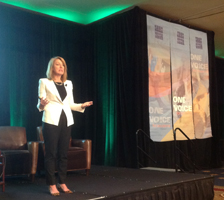How can being rookie smart keep you competitive?

At the 2015 Association of California School Administrators Conference in Monterey, Calif., presenter, Liz Wiseman, an author, researcher, executive advisor and national speaker, raised the critical question, “How can being rookie smart keep you competitive?” The following is an excerpt of Wiseman’s presentation.
While most employees have the credentials to earn a job and do it well, many of them become complacent, stale and upended by those who are “rookie smart” in completing a task. According to Wiseman, rookie smarts is how we tend to think and act when we are mindful that we are doing something for the first time. She says that, “being new, naïve and even clueless can be an asset for today’s knowledge workers where constant learning is more valuable than mastering the task.”
Based on extensive research, Wiseman described four different rookie mindsets. She said the Backpacker mindset is open and flexible to new possibilities, ready to search for new terrain and avoids getting trapped in outdated best practices. The Hunter-Gatherer seeks the advice of experts that provide ideas and resources to address difficult challenges. The Firewalker takes small and calculated steps while moving rapidly and enlisting feedback to stay on course. The Pioneer keeps things simple, focuses on meeting core needs and works tirelessly while pushing boundaries.
 Wiseman explained that people are built for challenges and the fastest way to raise satisfaction on the job is to give people harder or challenging work instead of more work. As a testament, she discussed her experience at age 24 where she was a rookie on the job at Oracle teaching software to new recruits and put in charge of training company-wide to build a new corporate university. With the company’s future at state, Wiseman described how she applied the research of being rookie smart to establish Oracle University.
Wiseman explained that people are built for challenges and the fastest way to raise satisfaction on the job is to give people harder or challenging work instead of more work. As a testament, she discussed her experience at age 24 where she was a rookie on the job at Oracle teaching software to new recruits and put in charge of training company-wide to build a new corporate university. With the company’s future at state, Wiseman described how she applied the research of being rookie smart to establish Oracle University.
Wiseman helped conference participants understand the rookie smarts concept by asking us to: identify a time when we had a hard or challenging task; determine what we visualized that others could not visualize; identify who we sought for guidance; state what we did to improve ourselves quickly; determine how we used feedback to stay on course; and cite how we recovered from mistakes.
Applying these steps, I quickly thought of my doctoral experience. I used rookie smarts in identifying an appropriate statistical instrument for my dissertation. I consulted with a colleague who had a strong background in statistics. I learned how to use the statistical instrument at a knowledge level and consulted with my colleague and professor for validation enabling me to apply the appropriate instrument to support my dissertation defense. Practicing and collaborating with experts in the field kept me on course to overcome and eliminate possible mistakes.
According to Wiseman, “If we work with technology and science, 15 percent of what we know today will be relevant in five years.” For additional information on this research, read the book by Liz Wiseman entitled, Rookie Smarts: Why Learning Beats Knowing in the New Game of Work.
Dr. Ronald Holmes is the author of eight books, “Education Questions to be Answered,” “Current Issues and Answers in Education,” “How to Eradicate Hazing,” “Professional Career Paths” “Your Answers to Education Questions,” “How to revitalize the National Baptist Convention, USA, Inc.” “Completing the Dissertation: Tips, techniques and real-life experiences from Ph.D. graduates” and “Jacob’s Dream.” He is publisher of “The Holmes Education Post,” an education focused Internet newspaper. Holmes is a former teacher, school administrator and district superintendent. He can be reached at [email protected]

